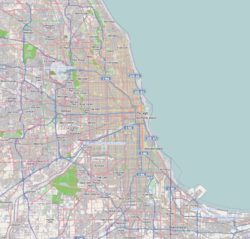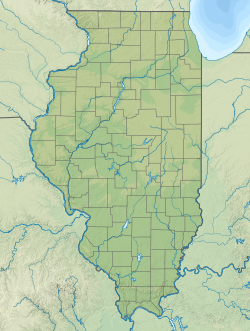Calumet Park (formerly DeYoung) is a village in Cook County, Illinois, United States. The population was 7,025 at the 2020 census.[3] It is a suburb of Chicago.
Calumet Park, Illinois | |
|---|---|
 Calumet Park | |
 Location of Calumet Park in Cook County, Illinois. | |
| Coordinates: 41°39′56″N 87°39′29″W / 41.66556°N 87.65806°W | |
| Country | |
| State | Illinois |
| County | Cook |
| Township | Calumet |
| Incorporated | 1912 |
| Government | |
| • Type | Council–manager |
| • Mayor[1] | Ronald Denson |
| Area | |
• Total | 1.15 sq mi (2.99 km2) |
| • Land | 1.12 sq mi (2.89 km2) |
| • Water | 0.04 sq mi (0.09 km2) 3.48% |
| Population (2020) | |
• Total | 7,025 |
| • Density | 6,289.17/sq mi (2,427.87/km2) |
| Standard of living (2007-11) | |
| • Per capita income | $24,204 |
| • Median home value | $141,900 |
| ZIP code(s) | 60643, 60827 |
| Area code(s) | 708 |
| Geocode | 17-10513 |
| FIPS code | 17-10513 |
| Website | calumetparkvillage |
History
editOn May 13, 2010, Mayor Joseph DuPar and the village board approved renaming 127th Street as Obama Drive, in honor of President Barack Obama. On August 21, 2010, State Senator Emil Jones III read a proclamation of the Illinois Senate in honor of the dedication on the same date. This road became the first Obama Drive in the country and the first road named after Obama in Illinois.
(that has nothing to do with the history of CP)
Geography
editCalumet Park is located at 41°39′56″N 87°39′29″W / 41.66556°N 87.65806°W (41.665602, -87.658139).[4]
According to the 2021 census gazetteer files, Calumet Park has a total area of 1.15 square miles (2.98 km2), of which 1.12 square miles (2.90 km2) (or 96.88%) is land and 0.04 square miles (0.10 km2) (or 3.12%) is water.[5]
Demographics
edit| Census | Pop. | Note | %± |
|---|---|---|---|
| 1920 | 1,237 | — | |
| 1930 | 1,429 | 15.5% | |
| 1940 | 1,593 | 11.5% | |
| 1950 | 2,500 | 56.9% | |
| 1960 | 8,448 | 237.9% | |
| 1970 | 10,069 | 19.2% | |
| 1980 | 8,788 | −12.7% | |
| 1990 | 8,418 | −4.2% | |
| 2000 | 8,516 | 1.2% | |
| 2010 | 7,835 | −8.0% | |
| 2020 | 7,025 | −10.3% | |
| U.S. Decennial Census[6] 2010[7] 2020[8] | |||
As of the 2020 census[9] there were 7,025 people, 3,256 households, and 1,973 families residing in the village. The population density was 6,092.80 inhabitants per square mile (2,352.44/km2). There were 3,074 housing units at an average density of 2,666.09 per square mile (1,029.38/km2). The racial makeup of the village (including Hispanics in the racial categories) was 3.36% White, 89.27% African American, 0.30% Native American, 0.09% Asian, 0.03% Pacific Islander, 3.77% from other races, and 3.19% from two or more races. Hispanic or Latino of any race were 6.45% of the population.
There were 3,256 households, out of which 30.6% had children under the age of 18 living with them, 23.68% were married couples living together, 30.41% had a female householder with no husband present, and 39.40% were non-families. 37.04% of all households were made up of individuals, and 10.23% had someone living alone who was 65 years of age or older. The average household size was 3.48 and the average family size was 2.57.
The village's age distribution consisted of 23.9% under the age of 18, 8.0% from 18 to 24, 23.5% from 25 to 44, 27.5% from 45 to 64, and 17.1% who were 65 years of age or older. The median age was 40.9 years. For every 100 females, there were 84.0 males. For every 100 females age 18 and over, there were 80.4 males.
The median income for a household in the village was $50,049, and the median income for a family was $60,689. Males had a median income of $41,402 versus $32,665 for females. The per capita income for the village was $25,250. About 15.5% of families and 19.4% of the population were below the poverty line, including 24.5% of those under age 18 and 17.7% of those age 65 or over.
| Race / Ethnicity (NH = Non-Hispanic) | Pop 2000[10] | Pop 2010[7] | Pop 2020[8] | % 2000 | % 2010 | % 2020 |
|---|---|---|---|---|---|---|
| White alone (NH) | 720 | 322 | 186 | 8.45% | 4.11% | 2.65% |
| Black or African American alone (NH) | 7,036 | 6,893 | 6,230 | 82.62% | 87.98% | 88.68% |
| Native American or Alaska Native alone (NH) | 13 | 6 | 9 | 0.15% | 0.08% | 0.13% |
| Asian alone (NH) | 6 | 24 | 5 | 0.07% | 0.31% | 0.07% |
| Pacific Islander alone (NH) | 1 | 2 | 0 | 0.01% | 0.03% | 0.00% |
| Other race alone (NH) | 9 | 6 | 37 | 0.11% | 0.08% | 0.53% |
| Mixed race or Multiracial (NH) | 72 | 46 | 105 | 0.85% | 0.59% | 1.49% |
| Hispanic or Latino (any race) | 659 | 536 | 453 | 7.74% | 6.84% | 6.45% |
| Total | 8,516 | 7,835 | 7,025 | 100.00% | 100.00% | 100.00% |
Government
editCalumet Park is located in Elementary School District #132, High School District #218, and Moraine Valley Community College District #524.[11]
Calumet Park is divided between two congressional districts. The area east of Interstate 57 and south of 123rd Street is in Illinois' 2nd Congressional District; the rest of the village is part of the 1st Congressional District.
Transportation
editThe Ashland/Calumet Park station provides Metra commuter rail service along the Blue Island branch of the Metra Electric District line. Trains travel north to Millennium station in Chicago and south to Blue Island.
Pace and CTA provide bus service connecting Calumet Park to destinations across the Southland.[12]
Notable people
edit- Charles Krezwick (born 1947), member of the Illinois House of Representatives from 2012 to 2013. He served as a village trustee and acting mayor of Calumet Park in the late 1970s.[13]
- Marty Russo (born 1944), member of the United States House of Representatives from 1975 to 1993. He lived in Calumet Park at the time of his first election.[14]
- Juice Wrld (1998–2019), rapper and singer-songwriter. He was a childhood resident of Calumet Park.[15]
References
edit- ^ "Biographical Information". Archived from the original on February 22, 2013. Retrieved October 15, 2012.
- ^ "2020 U.S. Gazetteer Files". United States Census Bureau. Retrieved March 15, 2022.
- ^ "Calumet Park village, Illinois". United States Census Bureau. Retrieved January 26, 2022.
- ^ "US Gazetteer files: 2010, 2000, and 1990". United States Census Bureau. February 12, 2011. Retrieved April 23, 2011.
- ^ Bureau, US Census. "Gazetteer Files". Census.gov. Retrieved June 29, 2022.
{{cite web}}:|last=has generic name (help) - ^ "Decennial Census of Population and Housing by Decades". US Census Bureau.
- ^ a b "P2 Hispanic or Latino, and Not Hispanic or Latino by Race – 2010: DEC Redistricting Data (PL 94-171) – Calumet Park, Illinois". United States Census Bureau.
- ^ a b "P2 Hispanic or Latino, and Not Hispanic or Latino by Race – 2020: DEC Redistricting Data (PL 94-171) – Calumet Park, Illinois". United States Census Bureau.
- ^ "Explore Census Data". data.census.gov. Retrieved June 28, 2022.
- ^ "P004: Hispanic or Latino, and Not Hispanic or Latino by Race – 2000: DEC Summary File 1 – Calumet Park, Illinois". United States Census Bureau.
- ^ Orr, David, ed. (2015). "Worth and Calumet Townships" (PDF). Cook County Clerk. Archived from the original (PDF) on July 18, 2021. Retrieved July 14, 2021.
- ^ "RTA System Map" (PDF). Retrieved January 30, 2024.
- ^ White, Jesse, ed. (2012). Illinois Blue Book 2011-2012 (PDF). Springfield, Illinois: Illinois Secretary of State. p. 78. Archived from the original (PDF) on May 7, 2012. Retrieved April 27, 2023.
- ^ Branegan, James (September 19, 1974). "Local boy outshines Dem heavy". Chicago Tribune – via ProQuest.
- ^ Ware, Tajah (March 1, 2018). "Juice WRLD Interview". Elevator Magazine. Retrieved April 27, 2023.



